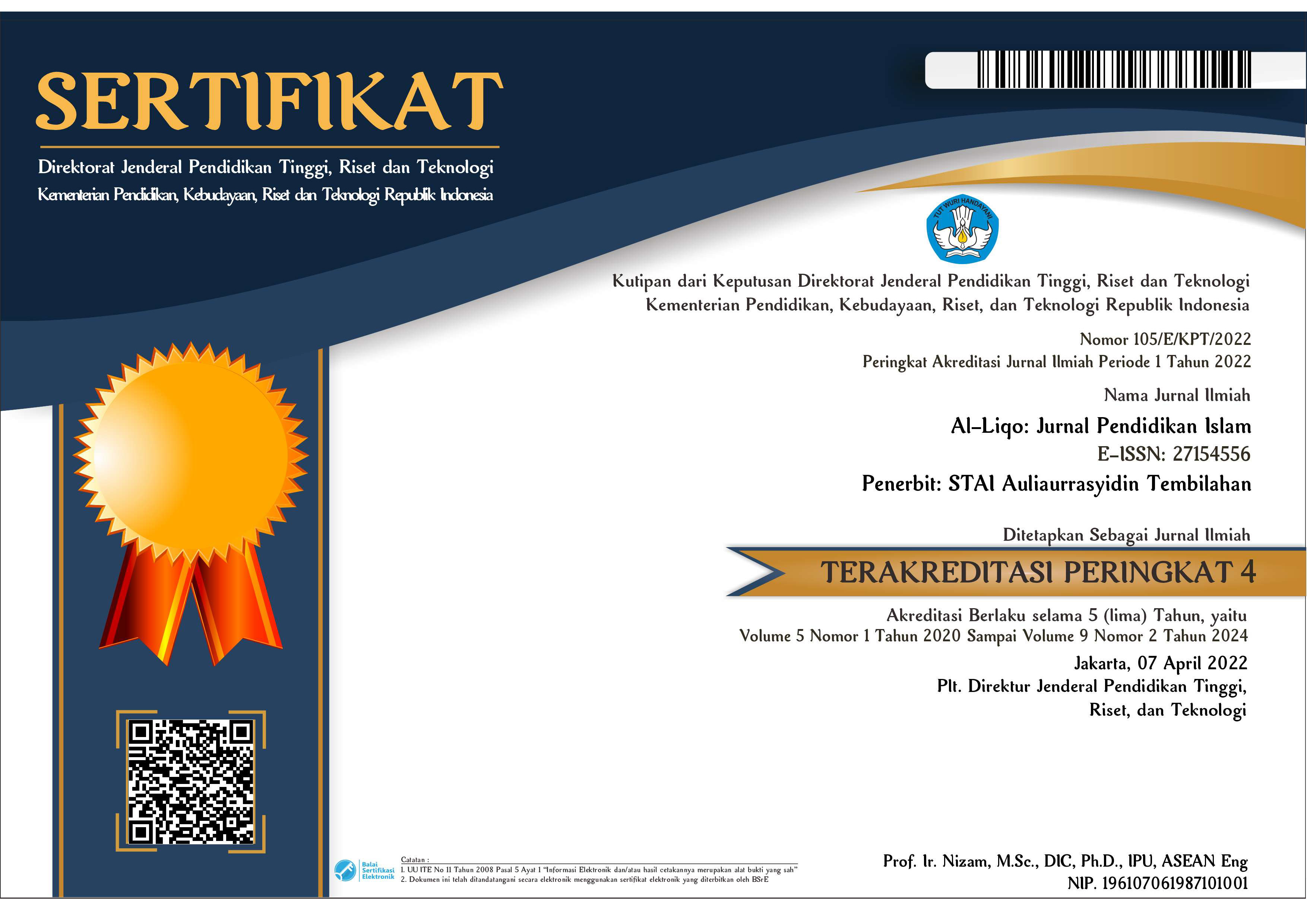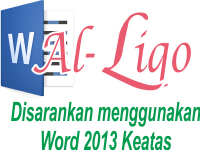Kesetaraan Pendidikan Perspektif Rahmah El Yunusiyah
DOI:
https://doi.org/10.46963/alliqo.v7i2.586Keywords:
Educational Equality, Women's Education, The Thought of Rahmah El-YunusiyahAbstract
This research is library research intended to examine whether the educational equality that Rahmah El-Yunusiyah fought for was intended as part of the feminism movement or was Rahmah's thought original and departed from a sociological study of the social facts of society, especially women at that time? The research data is referred to from the results of research related to the thoughts of Rahmah El-Yunusiyah which were published in scientific journals and various reference books relevant to this research. The data in this study were collected through documentation techniques, which were further analyzed inductively. The results of the study in this study indicate that the equality of education for women fought for by Rahmah is a social movement to break traditions in the midst of the Minangkabau community's perception of women's position and rights. According to her, education for women is one of the strategic steps in preparing a better future generation, because of the position of women as the pillar of the household, the first and main teacher for children, which is the foundation in shaping society and the state. Rahmah's thinking departs from her understanding of Islamic teachings and is not part of the feminism movement.
Downloads
References
Firmansyah, F. (2022).Tinjauan Filosofis Tujuan Pendidikan Islam. TA'LIM: Jurnal Studi Pendidikan Islam, 5(1).
Freire, P. (2007). Politik Pendidikan: Kebudayaan, Kekuasaan, dan Pembebasan (cet. 6). (Terjemahan Agung Prihantoro dan Fuad Arif Fudiyartanto). Yogyakarta: REäD dan Pustaka Pelajar.
Furoidah, A. (2019). Tokoh Pendidikan Islam Perempuan Rahmah El-Yunusiah. Falasifa, 10(2).
Isnaini, R. L. (2016). Ulama Perempuan dan Dedikasinya dalam Pendidikan Islam. (Telaah Pemikiran Rahmah El-Yunusiyah).Jurnal Pendidikan Agama Islam (Journal of Islamic Education Studies), 4(1).
Monicha, F.& Yenti, E. (2022). Perempuan Menurut Rahmah El-Yunusiyah dalam Perspektif Hadis. Humantech: Jurnal Ilmiah Multidisiplin Indonesia, 2(1).
Murtiningsih, S. (2004). Pendidikan Alat Perlawanan, Teori Pendidikan Radikal Paulo Freire. Yogyakarta: Resist Book.
Nata, A. (2005). Tokoh-tokoh Pembaruan dan Pendidikan Islam di Indonesia. Jakarta: RajaGrafindo Persada.
Nur’aeni, I., dkk. (2022). Peran Rahmah El-Yunusiyah dalam Pendidikan Islam Modern diIndonesia. (1923-1969).Historia Madania, 6(1), 131-146.
Rukiati, E. K. & Hikmawati, F. (2006). Sejarah Pendidikan Islam di Indoensia. Bandung: Pustaka Setia.
Smith, W. A. (2001).Conscientizacao: Tujuan Pendidikan Paulo Freire. (Terjemahan Agung Prihantoro). Yogyakarta: Pustaka Pelajar.
Soyomukti, N. (2010). Pengantar Sosiologi: Dasar Analisis, Teori & Pendekatan Menuju Analisis Masalah-masalah Sosial, Perubahan Sosial, & Kajian-kajian Strategis. Yogyakarta: Ar-Ruzz Media.
Usman, S. (2012).Sosiologi: Sejarah, Teori, dan Metodologi. Yogyakarta: Pustaka Pelajar.
Wati, S.& Eliwatis.(2021). Rahmah El-Yunusiyyah (Inspirator Pendidikan bagi Kaum Hawa).At-Tarbiyah Al-Mustamirrah: Jurnal Pendidikan Islam, 2(1).
Downloads
Published
Issue
Section
License
Copyright (c) 2022 Firmansyah

This work is licensed under a Creative Commons Attribution-ShareAlike 4.0 International License.
Authors who publish with this journal agree to the following terms:
1. Copyright on any article is retained by the author(s).
2. The author grants the journal, right of first publication with the work simultaneously licensed under a Creative Commons Attribution shareAlike 4.0 International License that allows others to share the work with an acknowledgment of the work’s authorship and initial publication in this journal.
3. Authors are able to enter into separate, additional contractual arrangements for the non-exclusive distribution of the journal’s published version of the work (e.g., post it to an institutional repository or publish it in a book), with an acknowledgment of its initial publication in this journal.
4. Authors are permitted and encouraged to post their work online (e.g., in institutional repositories or on their website) prior to and during the submission process, as it can lead to productive exchanges, as well as earlier and greater citation of published work.
5. The article and any associated published material is distributed under the Creative Commons Attribution-ShareAlike 4.0 International License







2.png)



